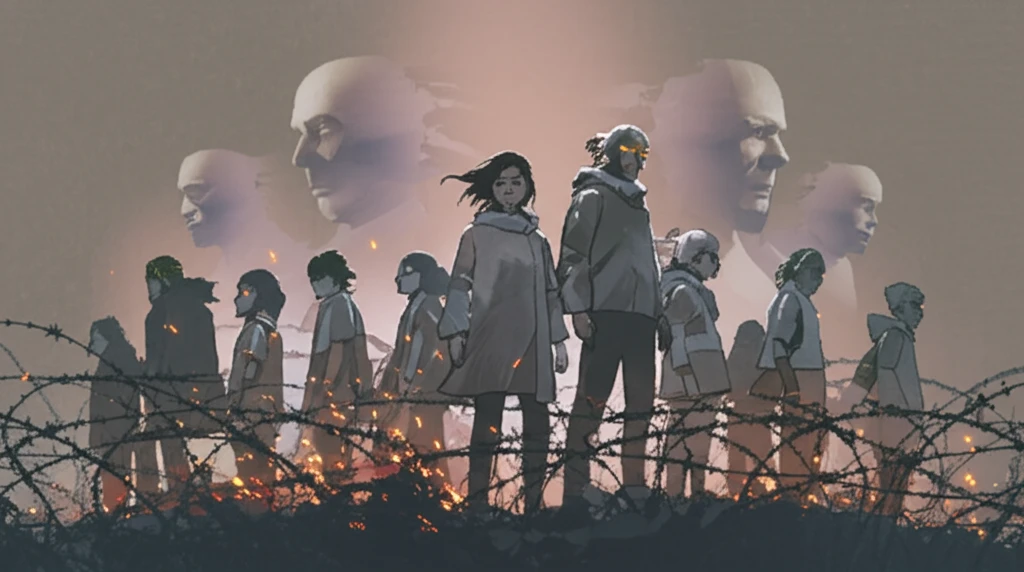
Ordinary Acts, Extraordinary Times: Rethinking Jewish Choices During the Holocaust
"Uncover the hidden stories of agency, resistance, and survival within Jewish communities during the Holocaust. How did ordinary Jews navigate impossible choices, and what lessons can we learn today?"
The Holocaust, a period of unparalleled horror in human history, often evokes images of helplessness and despair. However, beneath the surface of victimhood lie complex stories of resilience, agency, and resistance. While the atrocities committed by the Nazi regime are undeniable, focusing solely on the perpetrators risks overlooking the active roles Jewish individuals and communities played in their own survival. Evgeny Finkel's 'Ordinary Jews: Choice and Survival during the Holocaust' challenges the narrative of Jewish passivity, inviting us to reconsider the choices made by ordinary people in extraordinary circumstances.
Finkel's work builds upon a growing body of scholarship that seeks to understand the Holocaust from the perspective of its victims. By examining the experiences of Jewish communities in three distinct ghettos—Khmel’nik, Bialystok, and Minsk—Finkel reveals the diverse strategies they employed to cope with Nazi oppression. These strategies ranged from cooperation and compliance to evasion and resistance, each reflecting the unique circumstances and resources available to different communities.
This article delves into Finkel's research, highlighting the key factors that shaped Jewish choices during the Holocaust. We will explore the concept of 'choiceless choices,' the role of pre-war social and political structures, and the importance of inter-ethnic relations in determining survival outcomes. By understanding the complexities of Jewish responses to the Holocaust, we can gain a more nuanced and complete understanding of this tragic chapter in history, and draw valuable lessons about human resilience in the face of unimaginable adversity.
Challenging 'Choiceless Choices': Agency in the Face of Annihilation

One of the most significant contributions of Finkel's work is his challenge to the concept of 'choiceless choices,' a term coined by Lawrence Langer to describe the impossible dilemmas faced by Holocaust victims. While acknowledging the extreme constraints imposed by Nazi oppression, Finkel argues that Jews were not simply passive victims, but active agents who made choices—often agonizing ones—that influenced their chances of survival.
- Cooperation and Collaboration: Some Jewish individuals and councils chose to cooperate with the Nazi authorities in an attempt to maintain order and protect their communities. This strategy was often controversial, as it involved making difficult compromises and potentially betraying fellow Jews.
- Coping and Compliance: Many Jews adopted a strategy of coping and compliance, seeking to survive by adhering to Nazi regulations and avoiding direct confrontation. This involved enduring hardship and humiliation, but it offered a chance to stay alive in the short term.
- Evasion: Evasion involved escaping from the ghettos and attempting to pass as non-Jews. This was a risky strategy, as it required forged papers, money, and connections to sympathetic individuals.
- Resistance: Resistance involved actively fighting back against the Nazi regime, either through armed uprisings or acts of sabotage. This was the most dangerous strategy, but it offered the potential to inflict damage on the enemy and inspire hope in others.
The Enduring Lessons of Ordinary Jews
Evgeny Finkel's 'Ordinary Jews' is a powerful and important book that challenges us to rethink our understanding of the Holocaust. By focusing on the choices made by ordinary people in extraordinary circumstances, Finkel reveals the agency, resilience, and diversity of Jewish communities during this tragic period. His work offers valuable insights into human behavior under mass violence and reminds us of the importance of remembering and honoring the victims of the Holocaust.
